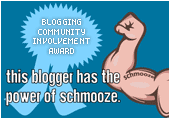Stress in the home (office)
A client e-mailed me the other day wondering about the status of a project I was managing. As I started to e-mail the client we were working with, I happened to glance at my Inbox. There was an e-mail from just that client - project completed. I had never followed up.
After a profuse apology to my client, I looked again at my list of messages. How had I missed that? The message was dated on Thursday. The day before a horrific level of stress descended on our heads.
Without going into details, I will simply say that it was the kind of stress that (however temporarily) shut our household down for the weekend while we tried to figure out how to manage it. On Saturday and most of Sunday, I left the computer off while we focused on our children and neglected housework and each other. On Monday I got back to work, but it was work (okay, fiction) that helped me relax at the same time that it needed to get done. Everything else? Completely out of my mind.
I'm sure that my client wasn't too impressed with me. The fact is, though, that he has an office to escape to. I don't.
If this type of thing happens again in the future, I hope I'll retain the presence of mind to tell my clients that I'll be away for a few days unexpectedly. Meanwhile, I think this remains an unfortunate byproduct of working at home. Since those who have offices may never understand the degree to which some stress can affect us at home, the best we can do - in my opinion - is give ourselves a break, understand our own limitations, and take care of ourselves and our families when the situation requires it.
Clients who won't abide this will take their business elsewhere. Clients who understand (as much as they can) become your anchors. The old 80-20 rule - 80 percent of your business comes from 20 percent of your clients - applies here. Which clients do you want when you have family, health, home, or other troubles? The ones who stick with you. Even if you annoy them sometimes, even if they annoy you sometimes, even if they don't pay the most or pay you on time - the most important thing is how they respond to your emergencies.
After a profuse apology to my client, I looked again at my list of messages. How had I missed that? The message was dated on Thursday. The day before a horrific level of stress descended on our heads.
Without going into details, I will simply say that it was the kind of stress that (however temporarily) shut our household down for the weekend while we tried to figure out how to manage it. On Saturday and most of Sunday, I left the computer off while we focused on our children and neglected housework and each other. On Monday I got back to work, but it was work (okay, fiction) that helped me relax at the same time that it needed to get done. Everything else? Completely out of my mind.
I'm sure that my client wasn't too impressed with me. The fact is, though, that he has an office to escape to. I don't.
If this type of thing happens again in the future, I hope I'll retain the presence of mind to tell my clients that I'll be away for a few days unexpectedly. Meanwhile, I think this remains an unfortunate byproduct of working at home. Since those who have offices may never understand the degree to which some stress can affect us at home, the best we can do - in my opinion - is give ourselves a break, understand our own limitations, and take care of ourselves and our families when the situation requires it.
Clients who won't abide this will take their business elsewhere. Clients who understand (as much as they can) become your anchors. The old 80-20 rule - 80 percent of your business comes from 20 percent of your clients - applies here. Which clients do you want when you have family, health, home, or other troubles? The ones who stick with you. Even if you annoy them sometimes, even if they annoy you sometimes, even if they don't pay the most or pay you on time - the most important thing is how they respond to your emergencies.


